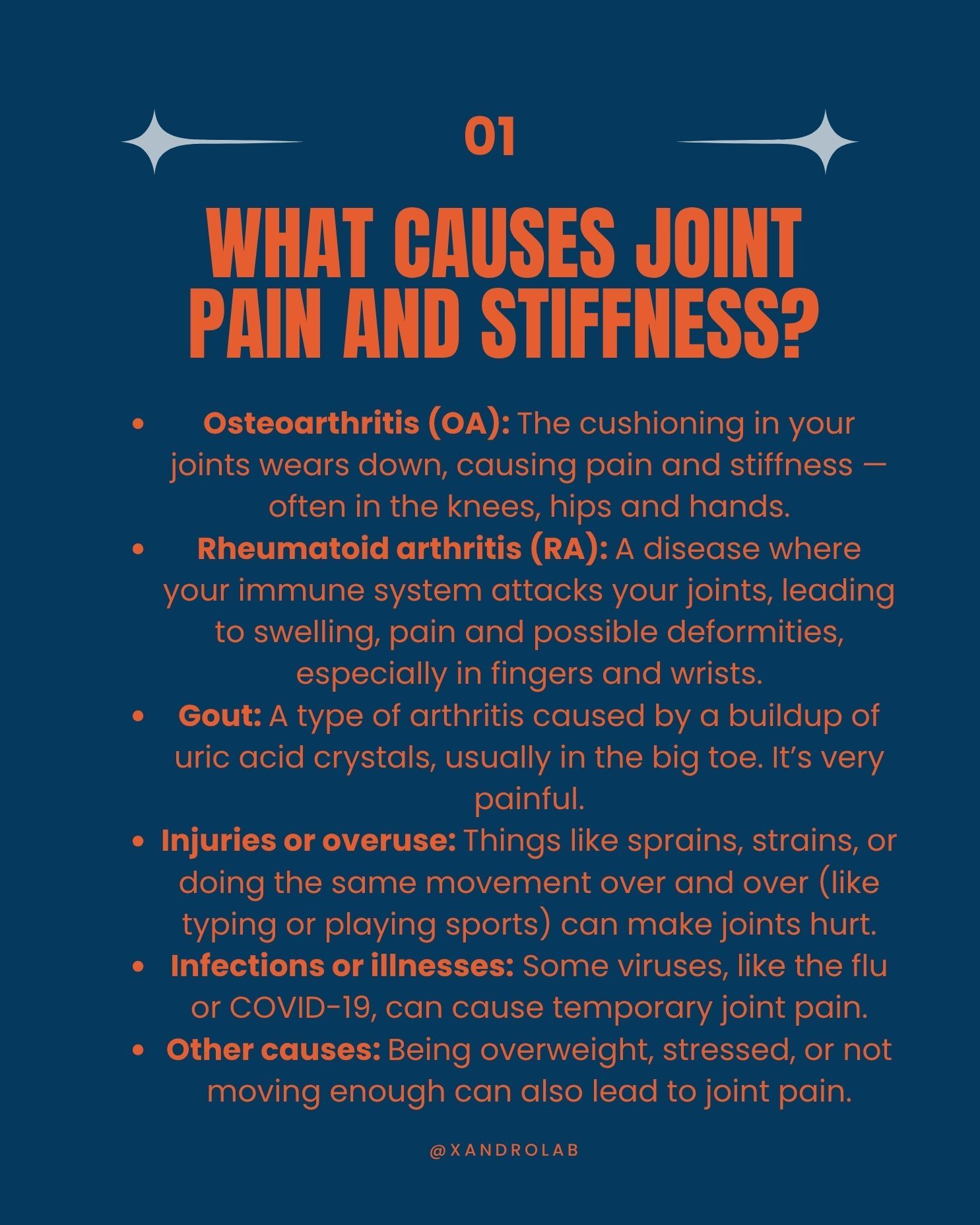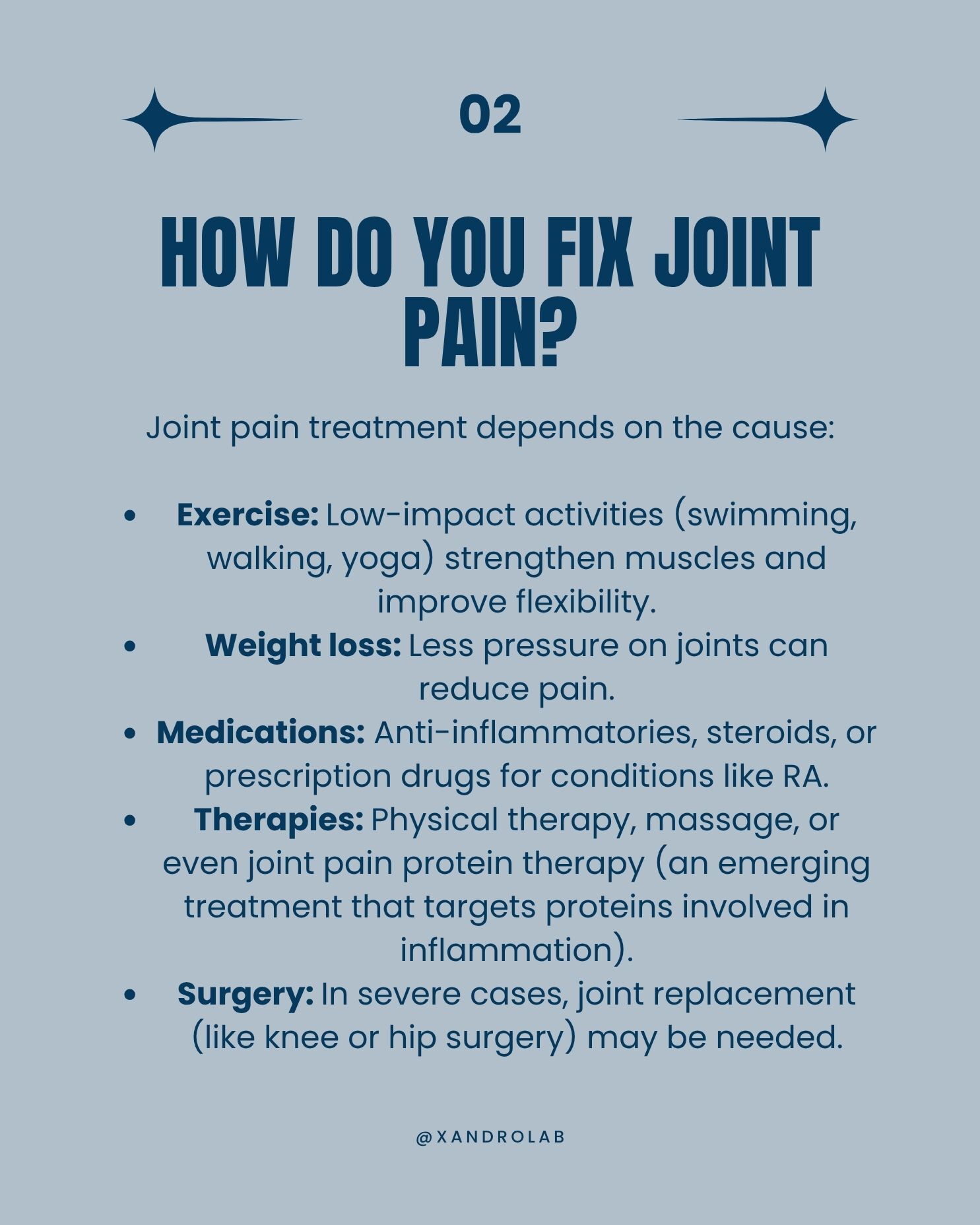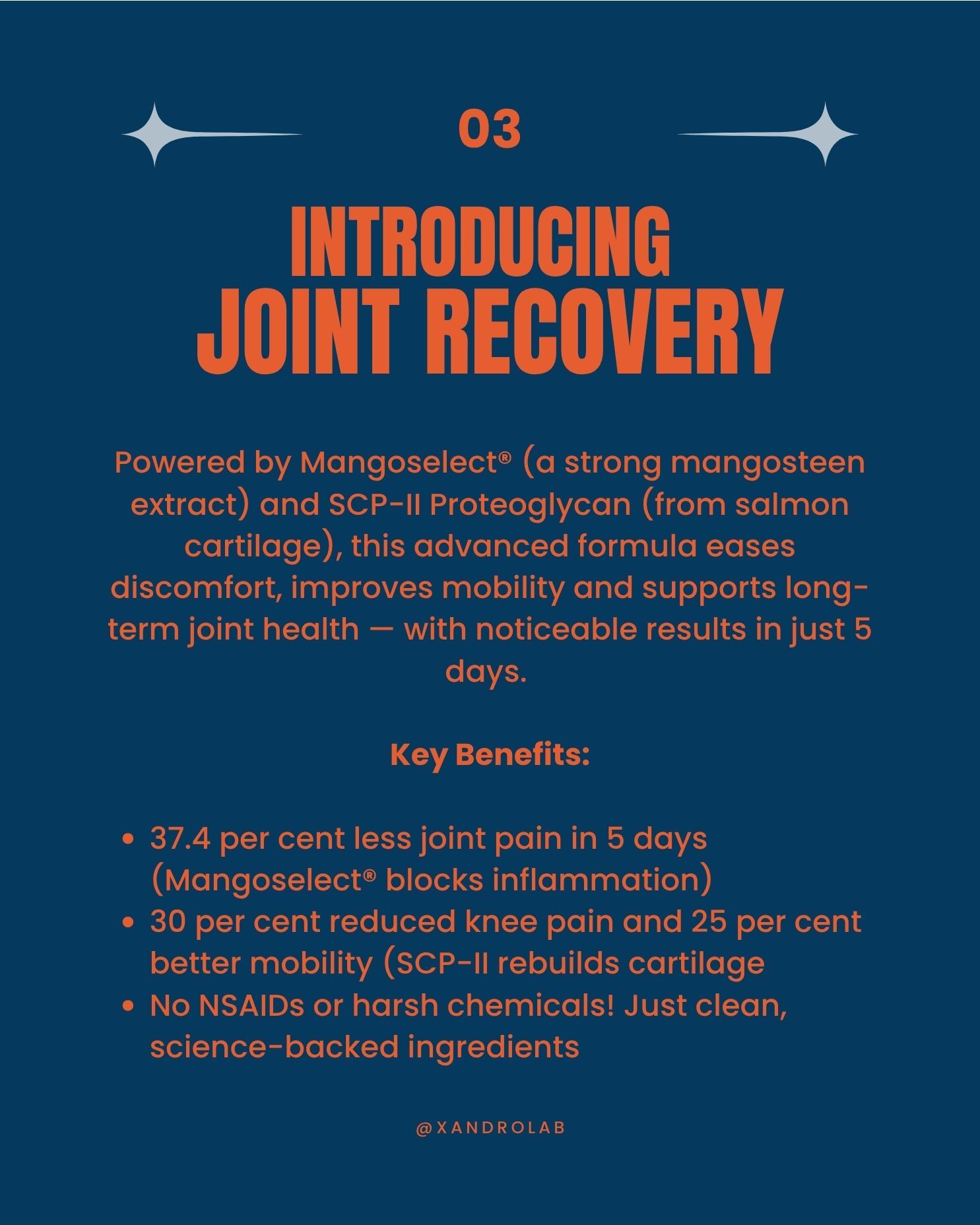Can Supplements Help Joint Stiffness?
24th Jun 2025
Understanding Joint Pain: Causes, Symptoms and Supplements for Relief
We just published a blog post on supplements for joint and muscle pain, but we thought we’d delve a bit deeper into joint issues.
Joint pain is a common issue that affects people of all ages, though it becomes more frequent as we get older. It can range from a mild ache to severe discomfort, making everyday movements difficult.
Joints are the connections between bones and when they hurt, it’s often due to inflammation, injury, or wear and tear over time.
What Causes Joint Pain All Over the Body?
So, what is joint pain a symptom of? Joint pain can stem from many different conditions, the most common causes including:
- Osteoarthritis (OA): This ‘wear-and-tear’ arthritis happens when the protective cartilage in joints breaks down, leading to pain and stiffness. It often affects knees, hips and hands.
- Rheumatoid arthritis (RA): Unlike OA, RA is an autoimmune disease where the body attacks its own joints, causing swelling, pain and sometimes deformities, especially in the fingers and wrists.
- Gout: A painful form of arthritis caused by uric acid crystals building up in a joint, often the big toe.
- Injuries or overuse: Sprains, strains and repetitive motions (like typing or sports) can lead to joint pain.
- Infections or illnesses: Sometimes, viruses (like the flu or COVID-19) trigger temporary joint pain.
Other factors like being overweight, stress, or lack of movement can also contribute to joint discomfort.

What Does Joint Pain Feel Like?
Joint pain can vary:
- Osteoarthritis pain often feels like a dull ache or stiffness, especially after activity.
- What does RA joint pain feel like? RA joint pain is usually more intense, with swelling, warmth and tenderness — often worse in the morning.
- Gout pain comes on suddenly and is sharp and throbbing.
Some people describe joint pain as a burning sensation or a ‘grating’ feeling when moving. Stiffness is also common, making it hard to bend or straighten the joint.
What is the First Aid for Joint Pain?
If you suddenly experience joint pain (like after an injury), the PRICE method can help:
- Protect the joint (with a brace or bandage).
- Rest and avoid activities that worsen pain.
- Ice the area for 20 minutes every few hours.
- Compress with a snug (but not tight) wrap.
- Elevate the joint above heart level to reduce swelling.
For chronic pain, gentle movement, heat therapy and over-the-counter pain relievers (like ibuprofen or acetaminophen) may help.
What is Joint Stiffness? Joint stiffness is when your joints feel tight, hard to move, or less flexible, especially after resting (like waking up in the morning) or overusing them. It’s common with ageing, arthritis, or injury, and can make simple tasks (like climbing stairs or gripping objects) harder. Causes include inflammation, cartilage wear, or fluid loss in joints.
How Do You Fix Joint Pain?
Joint pain treatment depends on the cause:
- Exercise: Low-impact activities (swimming, walking, yoga) strengthen muscles and improve flexibility.
- Weight loss: Less pressure on joints can reduce pain.
- Medications: Anti-inflammatories, steroids, or prescription drugs for conditions like RA.
- Therapies: Physical therapy, massage, or even joint pain protein therapy (an emerging treatment that targets proteins involved in inflammation).
- Surgery: In severe cases, joint replacement (like knee or hip surgery) may be needed.

When to See a Doctor about Joint Pain
Speak with your doctor for medical help if:
- Pain is severe or lasts more than a few days.
- The joint is red, hot, or swollen.
- You have a fever or unexplained weight loss.
- You can’t move the joint normally.
How to Prevent Joint Pain & Stiffness
- Stay active (but avoid overuse).
- Eat a balanced diet (foods rich in omega-3s and antioxidants help).
- Maintain a healthy weight.
- Quit smoking (it worsens inflammation).
Joint pain doesn’t have to control your life. With the right care — whether it’s simple home remedies, exercise, or medical treatment — you can stay mobile and keep doing the things you love. If pain persists, don’t ignore it; early treatment can make a big difference!
The Best Supplements for Joint Stiffness: Do They Really Work?
While exercise, weight management, and medications help, many people turn to joint supplements for extra relief. But is there a joint supplement that really works?
Let’s break down the science behind the most popular options and learn about what is good for joint pain and stiffness.
Glucosamine & Chondroitin
These two supplements are among the most well-known for joint health. Glucosamine is a natural component of cartilage, while chondroitin helps retain water in cartilage, keeping it spongy and shock-absorbent.
- Do they work? The research is mixed. Some studies suggest they may slightly reduce knee osteoarthritis pain, while others find no better than a placebo. A major 2016 study even found that some people felt worse on these supplements.
- Best dose:
- Glucosamine sulphate: 1,500mg daily (may be more effective than glucosamine hydrochloride).
- Chondroitin sulphate: 800–1,200mg daily.
- Who should avoid it? People with shellfish allergies (most supplements are derived from shellfish), those on blood thinners (like warfarin), or diabetics (glucosamine may affect blood sugar).
Omega-3s
Omega-3 fatty acids, found in fish oil and krill oil, are famous for their anti-inflammatory effects. They’re especially helpful for rheumatoid arthritis (RA), where inflammation drives joint damage.
- Do they work? Studies show omega-3s can reduce joint pain and stiffness in RA, but evidence for osteoarthritis (OA) is weaker.
- Best dose: 1,000–1,600mg daily of combined EPA & DHA (the active forms of omega-3s).
- Plant-based option? Algae-based omega-3s work for vegans (flaxseeds have a weaker form called ALA).
While regular fish oil may help with joint pain, if you’re also after added benefits of brain and eye health, make sure your supplement contains omega-3s bound with LPC, such as LPC Neuro, as this allows them to cross the blood-brain barrier.
Curcumin (Turmeric)
Turmeric’s golden compound, curcumin, is a powerful anti-inflammatory, sometimes compared to ibuprofen, but without the stomach risks.
- Do they work? If you’re looking for the best joint supplement for knees, research suggests curcumin can ease knee OA pain, but absorption is tricky. Look for formulations with black pepper (piperine) or enhanced bioavailability (like Theracurmin) and BCM 95®, such as in BCM 95® Turmeric Curcumin.
- Best dose: 500–1,500mg daily for at least 3 months.
- Watch out: May interact with blood thinners (like warfarin).
SAM-e
SAM-e (S-adenosylmethionine) is a natural compound that may reduce joint pain and even boost mood, making it great for those with arthritis and mild depression.
- Do they work? Some studies show it’s as effective as NSAIDs (like ibuprofen), but results vary.
- Best dose: 800–1,200mg daily (takes weeks to see effects).
- Caution: May not be safe for people with bipolar disorder or on antidepressants.
Vitamin D & K
What vitamin deficiency causes stiff joints? A vitamin D deficiency is linked to joint pain and stiffness, especially in colder months. Vitamin K helps maintain cartilage.
- Do they work? If you’re deficient, supplementing may help, but extra vitamins won’t fix joint pain if levels are already normal.
- Best sources: Sunlight (for D), leafy greens (for K), or supplements (check blood levels first).
Mangoselect®
Xandro Joint Recovery is your daily solution for fast, safe joint relief, backed by science. Powered by Mangoselect® (a strong mangosteen extract) and SCP-II Proteoglycan (from salmon cartilage), this advanced formula eases discomfort, improves mobility and supports long-term joint health, with noticeable results in just 5 days. Unlike traditional options like glucosamine, this natural, side-effect-free blend reduces inflammation, repairs cartilage and improves flexibility, making it ideal for active individuals, ageing adults and menopausal women experiencing joint stiffness.
Key Benefits:
- 37.4 per cent less joint pain in 5 days (Mangoselect® blocks inflammation)
- 30 per cent reduced knee pain and 25 per cent better mobility (SCP-II rebuilds cartilage)
- No NSAIDs or harsh chemicals! Just clean, science-backed ingredients
Whether you're an athlete protecting your joints or simply seeking everyday comfort, Xandro Joint Recovery helps you move freely and confidently. Try it and feel the difference!

End Note
So, do joint supplements really work?
While no supplement is a magic fix, some, like omega-3s, curcumin and SAM-e, may offer modest relief when combined with a healthy lifestyle. If you’re struggling with joint pain and stiffness, talk to your doctor before starting any new supplement to ensure it’s safe and worth trying.
